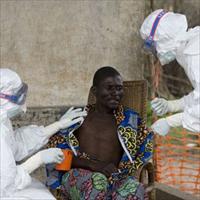UGANDA: Medical staff bore the brunt of "sly" new Ebola virus

As Uganda's western district of Bundibugyo grapples with the consequences of an outbreak of the Ebola virus, which has killed 22 people in three months, medical officials have blamed what they term the "slyness" of the virus for the high death toll among medical staff.
"It has taken us three months to diagnose that this was Ebola," Sam Zaramba, the director-general of health services, told IRIN on 6 December. "It presented itself differently from the known haemorrhagic fevers. Instead of patients passing blood from body openings, it was characterised by high fever, abdominal pain, diarrhoea, vomiting and headaches."
When the disease broke out in September, health workers in Bundibugyo thought it was one of the many common ailments prevalent among the 250,000 population, mainly farmers of cocoa, rice and vanilla and small-scale cattle-raisers.
Zaramba said the disease could have spread unnoticed in the ensuing medical confusion, with its characteristic haemorrhaging obscured by companion ailments, only to emerge when cases were tested at hospital. This presentation, he said, made health workers think the disease was a “normal" ailment.
"This was the main reason why many [medical personnel] have fallen victim and four of them have since died," Zaramba said. Three of these medical workers died on 5 December; one was the head of a health centre in Bundibugyo.
"They did not use any protection when attending to patients," Zaramba said. "However, we have now supplied enough protective gear to all health units in the affected district and we have asked them to treat every patient with caution."
Sam Okware, the chairman of the National Ebola Taskforce, said the Ebola strain identified in Bundibugyo was "completely different" from the four known sub-types of the highly contagious haemorrhagic fever - Ebola Sudan, Ebola Zaire, Ebola Reston, which only affects monkeys, and Ebola Tai, recorded in Côte d'Ivoire.
Ebola last struck Uganda in 2000 in the northern district of Gulu, and killed at least 170 people, including Matthew Lukwiya, then medical superintendent of Lacor hospital, who spearheaded the fight against the disease.
Several other medical workers also lost their lives during the 2000 epidemic, suspected to have struck soon after the return of Ugandan soldiers from the Democratic Republic of Congo (DRC) where the national army fought alongside rebels against the government of then president Laurent Kabila.
Monitoring patients
Zaramba said the authorities were monitoring hundreds of people believed to have had contact with some of those infected. "We are monitoring 330 people in the community," Zaramba said. "These are the people who had contact or had been near Ebola patients."
Zaramba said of the 330, 93 fitted the diagnosis of Ebola and 38 were admitted to health centres in Bundibugyo where isolation units had been erected. The death toll in this outbreak is 22 so far.
Samuel Kazinga, resident district commissioner for Bundibugyo, said some patients had gone into hiding for fear of possible contamination in hospitals. This, he said, had complicated the drive to isolate cases.
"The Congolese have also closed their border at Busunga and installed customs officers, who are not allowing the movement of people between the two nations," he said.
At the same time as the Ebola outbreak spread to districts neighbouring Bundibugyo, the health ministry was swamped with outbreaks of plague, meningitis, hepatitis and cholera that have killed 33 people.
The ministry reported 569 cases of cholera in western and northwestern Uganda with 12 deaths; 121 plague cases in Arua with 10 deaths and 39 cases in Nebbi, with nine deaths.
At least 255 cases of meningitis have been reported in Arua district and 32 cases of viral hepatitis with two deaths in northern Kitgum district.
According to the ministry, the main victims of plague are women because they sleep on the ground while men sleep on beds; fleas that spread plague can only jump six inches from the ground.
"They feast on those sleeping on the ground and these are mainly women," Emmanuel Otaala, the state minister for health, said. "We are encouraging men to allow women sleep on beds also."
 Back and Next - Back and Next
Back and Next - Back and Next See Also - See Also
See Also - See Also